In this post, I have covered the problems related to living near polluted areas and its effect on the air conditioner coiling. Types of corrosion the AC suffers from and the technologies used to tackle it.
Problem near Coastal regions and Drainage System
Consumers who use air conditioners in polluted regions often complain about “rusting” and “gas leakage” problems.
This is due to the corrosion of coiling used in the AC.
While the indoor unit having evaporator coils is less susceptible to corrosion than outdoor unit having condenser coils.
This is because the outdoor unit is placed in the outside environment making it a sweet spot for dust, salt, chemicals, etc.
Result of Corrosion
- Poor Cooling Efficiency
- Damage to the coiling
- Gas leakage
Coastal Regions
Atmosphere near coastal regions is high in dust, salts, acid, and humidity.
The condenser of AC’s often gets corroded within 1-2 years of use near such types of regions.
It does not matter whether the condenser coiling is made of copper or aluminum.
Solution
- Buy AC with anti corrosion technology
- Frequently service the AC
Drainage System(nala)
If you live near a drainage system or nala, then your AC is susceptible to corrosion and may only last 1-2 years.
This is especially true in polluted cities.
Why?
All the filth, hazardous chemicals, industrial waste from factories is dumped in such nalas.
The air in such area contains fumes of chemicals, hazardous gases like carbon monoxide, sulfur dioxide, nitrogen oxide, etc
Such air can decrease the life of the condenser unit by corroding it.
Solution
- Buy AC with anti corrosion technology (on Amazon)
- Frequently service the AC
Types of Corrosion
1. Galvanic corrosion
It occurs when two different metals come in contact with one another and there is presence of electrolyte such as salty water or dirty water.
An example for two different metals is aluminium and copper.
Usually the condenser coiling is made of copper and its fins are made of aluminum.
When electrical contact is made between such metals, ions travel from one metal to another resulting in corrosion.
2. Pitting corrosion
This occurs when the coil is exposed to water, chemicals or detergents containing chloride or fluoride.
Such type of corrosion results in “pits” or cavities in the metal surface creating gas leakage.
3. Formicary Corrosion
This occurs when adhesives, paints, and cleaning solvents come into contact with the coil.
Such corrosion causes pinhole leaks.
It is generally observed that copper is more prone to formicary corrosion than aluminum.
Anti Corrosion Technologies
If you want to save your AC coiling from corrosion then you must check these anti corrosion technologies.
1. Blue Fin
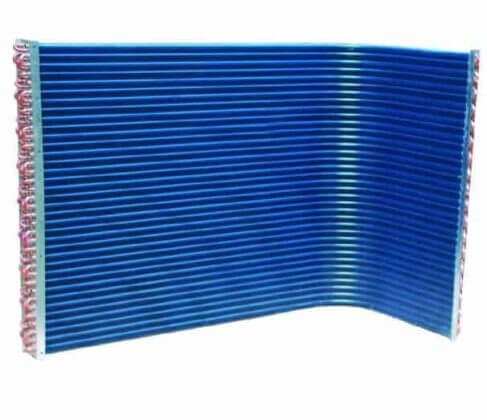
It is an epoxy coating applied on the fins which is used with the coil.
The epoxy coating present in bluefin prevents the water droplets, accumulation of salt, or acid disposition.
Mostly done on the indoor unit or on the evaporator coil.
It protects the evaporator coiling from corrosion and you can identify such coating from its blue color.
Blue-fin technology enhances the durability and longevity of the AC.
2. Gold Fin
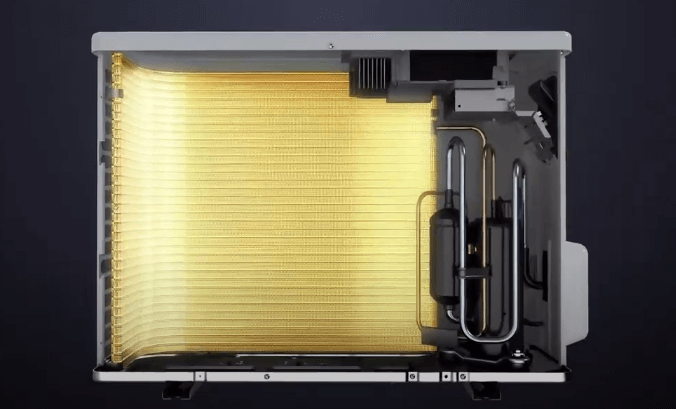
Similar to blue fin technology, it prevents the coiling from rust and corrosion and enhances the longevity of the AC.
Mostly see in the outdoor units or on the condenser coil.
You can identify such coating with its gold color.
Blue fin vs gold fin
Gold fin is better from blue fin technology for preventing the AC from corrosion.
As the outdoor unit is more prone to dust and chemicals, eventually leading to corrosion.
Gold fin is only used in the AC’s outdoor unit or on the condenser coil.
3. Ocean Black Protection
Present in only LG air conditioners.
It consists of aluminium fins coated with epoxy which provides anti-corrosion characteristics.
It is further coated with hydrophilic film for protecting the heat exchanger from moisture.
Ocean Black Protection is specially designed for Indian weather conditions, hot and humid summers, hard rains, pollution, smoke, dust, etc
You can check this technology in LG AC model PS-Q12YNXE1
4. Samsung Durafin Technology
Only available in Samsung air conditioners.
DURAFIN powered MultiJet Plus condensers which come with Anti-corrosion coating. DuraFin components are made of materials that are more resistant to corrosion with 36% more thickness.
And its larger condenser and optimized refrigerant flow enables it to endure extremely hot outdoor temperatures of up to 58°C.
Reference:
https://www.jacksonandsons.com/dealing-hvac-coil-corrosion
https://news.samsung.com/in/samsung-re-defines-durability-and-savings-in-acs-with-new-range

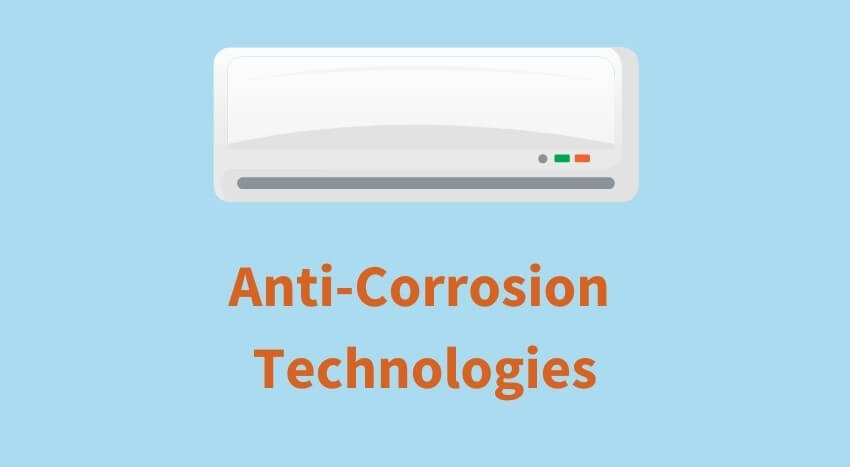
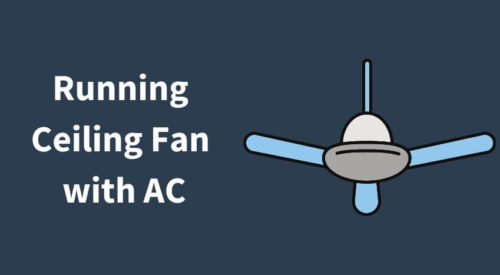

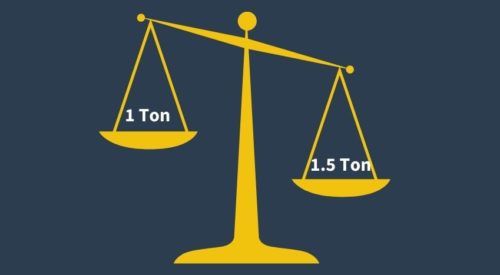
I believe that Japanese Companies are using Silicon Dioxide to protect car evaporators from oxidation. How effective do you think this is by comparison with the coatings you have listed?